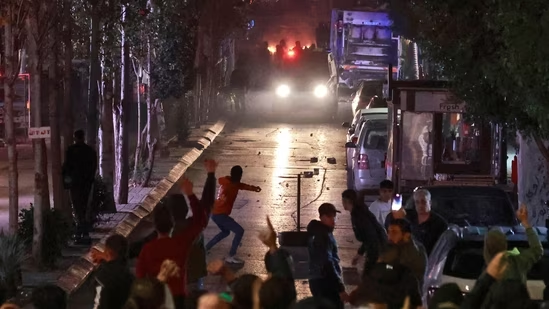Israel denies involvement in Gaza hospital strike, citing Palestinian Rocket
The Israeli military says it had no involvement in an explosion that killed hundreds of people at a Gaza City hospital and that the blast was caused by a misfired Palestinian rocket.

The Hamas-run Health Ministry in Gaza says an Israeli airstrike caused the blast, and that it killed some 500 people, many of whom had sought shelter from an ongoing Israeli offensive.
We're now on WhatsApp. Click to join.The Israeli military, however, said Palestinian militants had fired a barrage of rockets near the hospital at the time.
The Health Ministry run by Hamas said an Israeli airstrike on Tuesday hit a Gaza City hospital packed with wounded and other Palestinians seeking shelter, killing hundreds of people. If confirmed, the attack would be by far the deadliest Israeli airstrike in five wars fought since 2008.
The health ministry said at least 500 people had been killed. Photos and video purportedly from al-Ahli Hospital on social media showed fire engulfing the building and the hospital's grounds strewn with torn bodies, many of them young children. Around them in the grass were blankets, school backpacks and other belongings. The images could not immediately be independently verified.
The strike came as the U.S. was trying to convince Israel to allow the delivery of supplies to desperate civilians, aid groups and hospitals in the tiny Gaza Strip, which has been under a complete siege since Hamas' deadly rampage last week. President Joe Biden was due to visit the region Wednesday to show support for Israel and to try to prevent the war from spreading.
Hundreds of Palestinians had taken refuge in al-Ahli and other hospitals in Gaza City in past days, hoping they would be spared bombardment after Israel ordered all residents of the city and surrounding areas to evacuate to the southern Gaza Strip. Hamas called Tuesday’s hospital strike “a horrific massacre.”
Israeli military spokesman Rear Adm. Daniel Hagari said there were still no details on the hospital deaths: “We will get the details and update the public. I don’t know to say whether it was an Israeli air strike.”
In protest at the reported strike, Palestinian President Mahmoud Abbas cancelled his participation in a meeting with Biden, Jordan's King Abdullah II and Egypt's president set for Wednesday in Amman, Jordan to discuss the war. Abbas' Palestinian Authority runs parts of the West Bank.
Hundreds of Palestinians flooded the streets of major West Bank cities including Ramallah, the seat of the Palestinian Authority, where protesters hurled stones at Palestinian security forces who fired back with stun grenades.
Throughout the day Tuesday, airstrikes killed dozens of civilians and at least one senior Hamas figure in the southern half of the Gaza Strip, where the Israeli military had told Palestinians to evacuate to.
Before the al-Alhi Hospital deaths, Israeli strikes on Gaza killed at least 2,778 people and wounded 9,700, according to the Gaza Health Ministry. Nearly two-thirds of those killed were children, a ministry official said. Another 1,200 people across Gaza are believed to be buried under the rubble, alive or dead, health authorities said.
Israel sealed off Gaza after Hamas stormed into southern Israel on Oct. 7, killing more than 1,400 people, mostly civilians, and took some 200 captive into Gaza. Hamas militants in Gaza have launched rockets every day since, aiming at cities across Israel.
With tens of thousands of troops massed along the border, Israel has been expected to launch a ground invasion into Gaza — but plans remained uncertain.
“We are preparing for the next stages of war,” military spokesman Lt. Col. Richard Hecht said. “We haven’t said what they will be. Everybody’s talking about a ground offensive. It might be something different.”
In Gaza, dozens of injured were rushed to hospitals after heavy attacks outside the southern cities of Rafah and Khan Younis. An Associated Press reporter saw around 50 bodies brought to Nasser Hospital in Khan Younis.
An airstrike in Deir al Balah reduced a house to rubble, killing a man and 11 women and children inside and in a neighboring house, some of whom had evacuated from Gaza City. Witnesses said there was no warning before the strike.
Shelling from Israeli tanks hit a U.N. school in central Gaza where 4,000 Palestinians had taken refuge, killing six people and wounding dozens, the United Nations Palestinian refugee agencysaid. At least 24 U.N. installations have been hit the past week, killing at least 14 of the agency’s staff.
The Israeli military said it was targeting Hamas hideouts, infrastructure and command centers.
A barrage of strikes crashed into the Bureij refugee camp in central Gaza, leveling an entire block of homes and causing dozens of casualties among families inside, residents said. Among those killed was one of Hamas’ top military commanders, Ayman Nofal, the group’s military wing said — the most high-profile militant known to have been killed so far in the war.
Nofal, formerly the intelligence chief of Hamas’ armed wing, was in charge of Hamas militant activities in the central Gaza Strip, including coordinating activities with other militant groups.
Netanyahu sought to put the blame on Hamas for Israel’s retaliatory attacks and the rising civilian casualties in Gaza. “Not only is it targeting and murdering civilians with unprecedented savagery, it’s hiding behind civilians,” he said.
In Gaza City, Israeli airstrikes also hit the house of Hamas’ top political official, Ismail Haniyeh, killing at least 14 people. Haniyeh is based in Doha, Qatar, but his family lives in Gaza City. The Hamas media office did not immediately identify those killed.
With Israel barring entry of water, fuel and food into Gaza since Hamas’ brutal attack last week, U.S. Secretary of State Antony Blinken secured an agreement with Israeli Prime Minister Benjamin Netanyahu to discuss creation of a mechanism for delivering aid to the territory’s 2.3 million people. U.S. officials said the gain might appear modest, but stressed that it was a significant step forward.
Still, as of late Tuesday, there was no deal in place. A top Israeli official said Tuesday his country was demanding guarantees that Hamas militants would not seize any aid deliveries. Tzahi Hanegbi, head of Israel’s National Security Council, suggested entry of aid also depended on the return of hostages held by Hamas.
“The return of the hostages, which is sacred in our eyes, is a key component in any humanitarian efforts,” he told reporters, without elaborating whether Israel was demanding the release of all of the roughly 200 people Hamas abducted before allowing supplies in.
More than 1 million Palestinians have fled their homes — roughly half of Gaza's population — and 60% are now in the approximately 14-kilometer (8-mile) long area south of the evacuation zone, the U.N. said.
Aid workers warned that the territory was near complete collapse. Hospitals were on the verge of losing electricity, threatening the lives of thousands of patients, and hundreds of thousands of people searched for bread and water.
The U.N. agency for Palestinians said more than 400,000 displaced people are crowded into schools and other facilities in the south. The agency said it has only 1 liter of water a day for each of its staff members trapped in the territory.
Israel opened a water line into the south for three hours that benefitted only 14 percent of Gaza’s population, the U.N. said.
At the Rafah crossing, Gaza’s only connection to Egypt, truckloads of aid were waiting to enter. The World Food Program said that it had more than 300 tons of food waiting to cross into Gaza. Civilians with foreign citizenship — many of them Palestinians with dual nationalities — also waited in Rafah, desperate to get out.
Repeated reports that an opening was imminent have proven false as negotiations continued to grind on, including the U.S., Israel and Egypt.
A senior Egyptian official called it a “very tough, complicated back-and-forth process” and said talks were over deliveries through Rafah and Israel's Karam Shalom crossing to Gaza. He said Israel was insisting to search all aid, and wants to “ensure that such aid won’t benefit Hamas.” He said Egypt proposed that the U.N. oversee the whole process, including inside Gaza. The official spoke on condition of anonymity because he was not allowed to brief the press on the talks.
Officials for Hamas and Israel cast doubt on an immediate opening, saying they were unaware of an agreement.
Biden's visit in part aims to prevent the war from sparking a broader regional conflict. Violence flared Tuesday along Israel’s border with Lebanon, where Iranian-backed Hezbollah militants operate.
Israel evacuated towns near its northern border with Lebanon, where the military has exchanged fire repeatedly with Hezbollah militants.
Israel said it killed four militants wearing explosive vests who were attempting to cross into the country from Lebanon on Tuesday morning. No group immediately claimed responsibility.
Iran’s Supreme Leader Ayatollah Ali Khamenei warned that Israel's continuing offensive in Gaza could cause a violent reaction across the region.
“Bombardments should be immediately stopped. Muslim nations are angry,” Khamenei said, according to state media.
Disclaimer: The copyright of this article belongs to the original author. Reposting this article is solely for the purpose of information dissemination and does not constitute any investment advice. If there is any infringement, please contact us immediately. We will make corrections or deletions as necessary. Thank you.
Title:Israel denies involvement in Gaza hospital strike, citing Palestinian Rocket
Url:https://www.investsfocus.com







